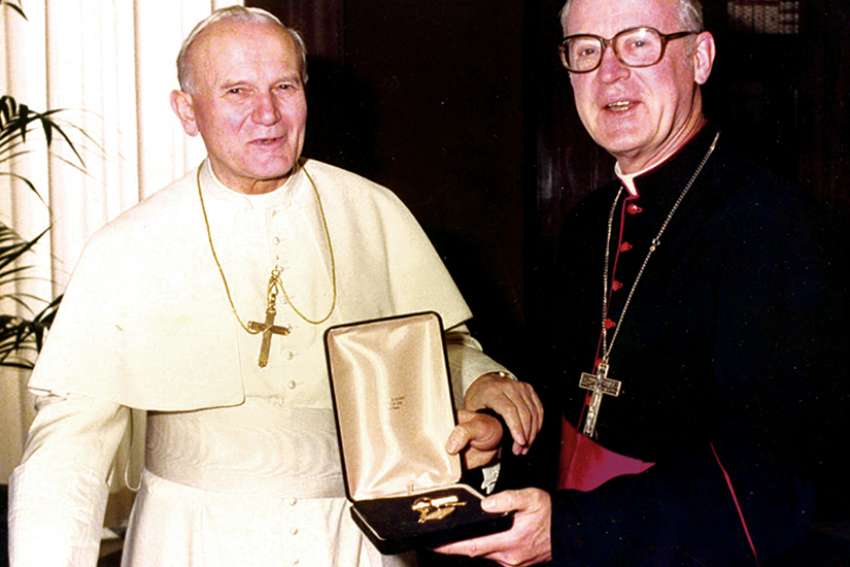It would seem ungrateful and even myopic to only express regret at a death which came at such a good age; or to wish for the prolongation of a life which the bishop himself was willing and prepared to let go.
Always a courageously forthright man who met challenges and adventures head on, I never knew Bishop Sherlock to hold back from any prospect. If anything, he was perhaps at times a little too impetuous in speaking his mind. But whenever he overshot the mark (and I’m not saying this happened often) he soon realized it and just as courageously admitted it and apologized. Instinctively convivial, the bishop sought to see the best in people and for the most part, that generosity of spirit was reciprocated. I never knew of anyone who bore him a grudge.
I often recall a brilliant autumn afternoon when we fell into a brief conversation outside the old central library and he must have exchanged greetings with a half dozen different interlopers who happened by in just those few minutes as we unlocked our bikes and piled our newly leased books into our carriers. A lot of civic leaders make a point of avoiding situations where their elbows might get rubbed in such a random way, but the bishop never seemed to find such encounters a strain.
The years of Sherlock’s episcopacy (1978-2002) almost perfectly coincided with the years of St. John Paul II’s papacy (1978-2005). And in his capacity as president of the Canadian Conference of Catholic Bishops, he organized the 1984 papal visit to Canada and accompanied JPII all across the country. It was a time he looked back on with special fondness for the rest of his life.
In 1994, I was the editor of a local entertainment weekly and Bishop Sherlock took me up right away when I asked if he would sit for a feature interview in our humble little rag that more often than not featured rock bands on the front cover. I think he saw it as an opportunity to engage in a little community outreach.
Early on, I asked him how old he was when he first knew he was called to the priesthood and couldn’t help saying “Yikes” when he gave the monosyllabic answer of “six.”
“It’s unusual but it’s not unique,” he went on to explain. “When I was six I made my first communion and my aunt gave me a book about saints. The story that I read was about Isaac Jogues, who was one of the Canadian Jesuit martyrs. In this story, Isaac’s mother was reading to him from The Jesuit Relations and as his mother read to him about New France in the 1600s, Isaac knew that he would become a priest and go to the new world. And when I read that, it was just like a light went on in my head — I’m going to do that, too.”
Fr. Michael Prieur, who taught moral theology for almost 50 years at St. Peter’s Seminary and regularly looked in on the ailing bishop throughout the last six months of his final physical decline, told me that his faithful colleague was ready to go: “He was a man of deep prayer and love for his brother bishops across the country and his own priests. Every day he prayed for many of them — by name — for at least 20 minutes. His elephantine memory remained until the end. On Pentecost Sunday this year during Mass on request, he recited the complete Sequence Veni Creator Spiritus in Latin. It underlined his love of the Trinity, especially the Holy Spirit. Right up to his 94th year, he loved to celebrate the weekly Monday Eucharist at the cathedral, and especially hearing confessions for an hour beforehand. He was always a pastor at heart.
“A month before his death, sitting in his chair, he pronounced, ‘This dying thing is difficult.’ He was ready every day. On a recent visit, he said he had a question for me. On offering to discuss it immediately, he declared, ‘Not now; I will call you at the end.’ He died about five days later, without calling me. He remained a bishop right to the end. I am sure God was able to answer his question. May he rest in peace.”
And the encounter I’ve been recalling most frequently in the days after his death is that Easter Vigil ceremony in 1984 when Bishop Sherlock baptized me and anointed me with holy oils and brought me into full communion with the Roman Catholic Church. Ever since that night he has been for me a man set apart by God who beckons me into the light. And that is a role that does not end with his death.
(Goodden is a writer in London, Ont.)


